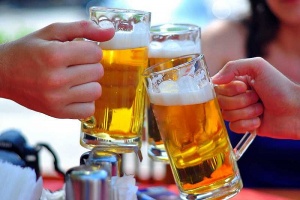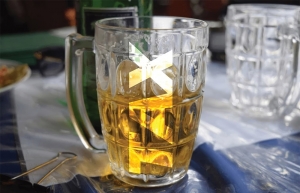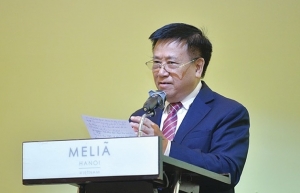INTERNATIONAL INVESTMENT
AND PORTAL
 Practical solutions appropriate regarding sugary drinks
Practical solutions appropriate regarding sugary drinks
In the draft Law on Special Consumption Tax (SCT), the ministry (MoF) proposed in late June to add soft drinks with sugar content of over five grams per 100ml to the taxable objects, which is not the first time the MoF has wanted to impose a SCT on soft drinks.
According to the organisations via documents sent to the MoF since the proposal was made, taxing sugary drinks is an effective intervention to reduce the consumption of these products.
The World Health Organization (WHO) has added a sugary drink tax to the list of recommended policy options to prevent and control diet-related diseases and address childhood obesity. According to the draft law, a 10 per cent tax on the selling price will increase the retail price of soft drinks by 5 per cent. However, the WHO said that this increase is modest, with very little impact on reducing consumer consumption.
The WHO recommended the MoF to build a roadmap to raise taxes towards 2030 so that the price of soft drinks increases by 20 per cent due to the tax. “This is aimed at reducing affordability and reversing the current trend of rapidly increasing consumption,” the WHO noted in information sent to the MoF.
The World Bank said that to increase the price by 20 per cent as the recommendation of WHO, the applicable tax rate should be 40 per cent or an absolute tax of VND7,000 (28 US cents) per litre.
More specifically, UNICEF recommended using a tax rate based on the proportion of sugar in the product, starting with a minimum of 20 per cent for a sugar content of 5g per 100ml.
“Experiences from other countries show that this measure will reduce the rate of overweight cases by 1-3 per cent and obesity by 1-4 per cent,” UNICEF emphasised, noting that children will be most affected by reducing purchases and consumption.
In a conference on the issue in late July in Hanoi, Truong Tuyet Mai, vice president of the National Institute of Nutrition, said that all documents on this issue have stressed the harmful effects of using sugary drinks, so raising taxes to increase product prices is a practical and effective solution.
“The tax threshold for sugary drinks is also 5g per 100ml, so producers only need to change technology, adjust the amount of sugar in the product to match the requirements, and the product will not be taxed,” Mai said.
Economist Dinh Trong Thinh added that imposing SCT on sugary drinks is the right thing to do, the issue is appropriate time and level. “SCT is a tax levied on consumers to regulate consumer behaviour, businesses are just taxpayers on behalf of consumers. Therefore, in addition to a short-term decline in output, businesses will not suffer any other impacts,” he assessed.
The MoF explained this is a new item to be added to the taxable list, so the ministry proposed a rate of 10 per cent to encourage businesses to produce and import low-sugar products, raise awareness, and adjust consumer behaviour.
In the view of businesses, Do Thai Vuong, head of the Beverage Subcommittee under the Vietnam Beer-Alcohol-Beverage Association, told VIR that soft drinks are not the main and only cause of overweight and obesity, which are caused by many factors like excessing energy intake and lack of physical activity.
“So imposing SCT is ineffective due to the substitution effect when consumers can switch to foods and drinks with more sugar and higher calories than soft drinks such as milk and cakes,” Vuong said.
He added that the consumption of sugary soft drinks in Vietnam is not high compared to other countries in the world. Many countries consume much more than Vietnam but do not impose SCT, and some others have applied this policy but did not achieve the target set forth and have abolished it already.
“In addition, imposing SCT will greatly affect the beverage and supporting industries such as sugar cane, packaging, retail, and logistics in Vietnam, especially small- and medium-sized enterprises,” Vuong said.
Nguyen Minh Thao, head of the Research Department on Business Environment and Competitiveness under the Central Institute for Economic Management, claimed that street food can also affect the health of consumers but is outside the scope of tax.
“We are studying how such taxation will affect budget revenue, labour, and income as well as economic growth,” she said, proposing that the MoF should only add soft drinks with sugar content over 5g per 100ml to the SCT list.
Nguyen Duy Hung, director of Legal Affairs of Tan Hiep Phat Group, said that if sugary drinks are taxed at 10 per cent, the selling price will also have to rise by 10 per cent.
“Because SCT is an indirect tax, consumers will have to pay it in the end. The government imposes the tax on producers, and they transfer this tax to the cost of the production and services. So the taxable subjects are consumers,” he said.
The MoF raised a similar proposal a decade ago but did not receive consensus from other ministries, agencies, or experts.
Many countries have imposed a tax on sugary drinks to prevent overweight and diseases related to sugary drinks. About 15 countries imposed an SCT on sugary drinks in 2012, and the number increased to at least 50 countries by 2021. Six out of 10 ASEAN countries have collected a SCT on sugary drinks, but some of them reported a continued increase in the rate of overweight and obesity after a period of applying the tax.
A document from the MoF sent to the government said that of the 26 European countries with a soft drink consumption of over 100 litres per person per year, only 11 countries apply SCT on soft drinks. Germany, which has the highest soft drink consumption rate in Europe, does not apply such a tax on soft drinks.
Japan, which also does not apply SCT on soft drinks, reports the lowest overweight and obesity rates in the world, with an obesity rate of 4.5 per cent in adults, and overweight and obesity rates in children of 3.8 and 4.1 per cent, respectively.
 Alcohol and beer could be subject to 100 per cent special consumption tax
Alcohol and beer could be subject to 100 per cent special consumption tax
The Ministry of Finance (MoF) has proposed increasing the special consumption tax (SCT) for alcohol and beer to 100 per cent by 2030.
 Conflicts apparent regarding proposed consumption tax
Conflicts apparent regarding proposed consumption tax
Beverage industry leaders continue to put across their views on the potential increase in special consumption tax on various beverages.
 Legitimate businesses must not be disadvantaged with alcohol tax
Legitimate businesses must not be disadvantaged with alcohol tax
The draft Law on Special Consumption Tax, including a high raise in the tax for alcohol, will have great and direct impacts on not only enterprises in the production and trading of alcohol and soft drinks, but also product chains, labour, and social security.



















